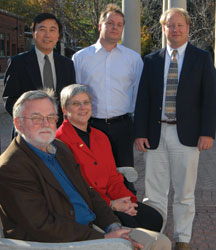|

Bright Minds
Expanding research horizons with GW’s five Fulbright
scholars

|

GW is the only university in the District with five
Fulbright scholars. The 2006-07 recipients are: (back
row, l-r) Larry Yu, Lars Willnat, Sean Cleary, (front
row, l-r) David Drummond Gow, and Geralyn Schulz.
Jessica McConnell
|
In 1946, U.S. Senator and GW Law School alumnus J. William
Fulbright, LLB ’34, established the Fulbright Program
to increase intellectual communication between countries through
the exchange of knowledge and skills. Since then, more than
250,000 individuals have received Fulbright Fellowships and
Scholarships, many of them university faculty who use the
awards to fund cross-cultural research projects.
Of the numerous 2006-07 Fulbright recipients in academic
institutions across the globe, five of them call GW home—making
GW the only university in the District with that many Fulbright
scholars.
The five are involved in a wide range of research activities,
taking them everywhere from the National University of Management
in Phnom Penh, Cambodia, to the University of Cauca in Colombia.
Blending teaching and research, each destination holds a special
importance to the faculty member.
As a Fulbright scholar at the Universiti Purtra Malaysia’s
Department of Communication, Lars Willnat, associate professor
of media and public affairs and international affairs, spent
time exploring the relationship between developing Asian democracies
and their culture, media, and politics. Working with a colleague,
he developed public opinion polls that looked at the media’s
role in political participation and the “stable tension”
between the Chinese and Malays.
“It’s great stuff,” says Willnat. “Especially
since most Western media researchers have ignored most large
Southeast Asian nations, such as Malaysia or Indonesia.”
This January, Larry Yu, associate professor of tourism and
hotel management, wasn’t far from Malaysia when he was
conducting research in Cambodia on future purchase behavior
and international tourist satisfaction. “Given the recent
surge in the country’s international tourism, I am interested
in investigating international tourist perceptions of satisfaction
with Cambodia, and tourist intention to return to or recommend
the country,” he says.
For David Gow, Baker Professor of Anthropology and International
Affairs, the Fulbright Fellowship serves to connect past research
with a future publication. Gow will spend the spring semester
teaching in the anthropology department at the University
of Cauca in Colombia. Not only will his work continue to explore
the tenure of Colombia’s first indigenous governor,
Taita Floro Tunubalá, but it also will utilize his
research toward a forthcoming book, Countering Development:
Indigenous Modernity and the Moral Imagination.
Spring will find Sean D. Cleary, associate professor of epidemiology
and biostatistics, teaching epidemiology to students in the
departments of microbiology and community medicine and family
health at Nepal’s Tribhuvan University, Institute of
Medicine in Kathmandu. In addition to teaching responsibilities,
Cleary, as a Fulbright Senior Scholar, will work on improving
health planning by examining the spatial distribution of diseases
in Nepal through geographic information systems. “Applying
small-area analysis techniques in Nepal can potentially have
a significant impact on disease control for infectious diseases,”
he says. “It will also be a useful tool for illuminating
and understanding health disparities.”
Australia was the perfect country for Geralyn Schulz to lecture
and research on speech rehabilitation, because it shares a
high incidence of neurological disorders with the United States.
Both countries, says the associate professor of speech and
hearing science, are concerned with implementing evidence-based
practice and functional outcome measures.
“This Fulbright project not only furthers my clinical
research goal of developing and assessing more efficacious
therapy methods for the rehabilitation of speech in persons
who have had neurological damage, it also furthers the goal
of speech pathology in the U.S. and Australia,” she
remarks of her impending work with the University of Queensland.
“It also furthers the mission of the Fulbright Scholarship
program to promote the exchange of ideas and to establish
joint international collaborations that promote greater mutual
understanding between nations.”
No doubt Fulbright himself would be proud of his intellectual
successors, each one of them furthering the intellectual and
cultural goals he established more than 60 years ago.
—Zak M. Salih
|